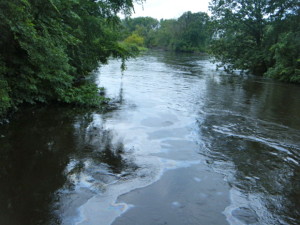We have much more to do and your continued support is needed now more than ever.
It’s Past Time for Strong Tar Sands Safety Regulations
On May 6, the federal agency responsible for protecting the public from pipeline oil spills quietly issued a notice intended to give a nudge for pipeline operators to do a better job. The notice is sobering for two reasons.
First, it reminds us of the almost 4-year-old pipeline disaster in Marshall, Michigan that has more or less permanently polluted the Kalamazoo River and the extreme dangers of moving toxic tar sands oil. Second, it stands as another stunning display of how inept and toothless regulations governing tar sands pipelines are.

The failures of Enbridge—a major pipeline company with a spotty record—were flabbergasting. Eighty-one percent of the oil that spilled was pumped after the rupture occurred and the company got indications a spill had happened. It took 17 hours for the company to respond to the spill.
The notice issued by the Pipeline and Hazardous Materials Safety Administration (PHMSA) points to “pervasive organizational failures” by Enbridge as a cause of the Marshall disaster. But these failures were already well documented by a scathing 2012 National Transportation Safety Board report comparing Enbridge to the Keystone Kops.
A March 2013 rupture of an aging tar sands pipeline in Mayflower, Arkansas that spilled about 210,000 gallons of tar sands and chased at least 22 families from their homes forever underscored the dangers of moving tar sands through pipelines.
Regulations? Or Suggestions?
One would think that in wake of such disasters, the agency charged with protecting us from pipeline spills would go on red alert. Instead, PHMSA has simply asked pipeline operators, who care about profits more than people and wildlife, to do a better job of policing themselves. The notice simply “encourages”
Pipeline owners and operators … to review their own … programs for similar deficiencies and to take corrective action.
It also offers helpful suggestions such as:
Operators should … consider training their control room staff as teams to recognize and respond to emergencies or unexpected conditions.
And it serves up Rumsfeldian gems like:
If … risk profile information is unknown, unknowable, or uncertain, the pipeline should be operated more conservatively.
In short, the notice advisory is emblematic of the entire problem with current safety regulations: PHMSA, which approved the safety plan for the line that burst in Michigan in a couple weeks and with no public input, can’t be bothered to police pipelines or put regulations in place that protect the public from tar sands. Instead, PHMSA is kindly asking the industry to do a better job of policing itself.
The notice concludes with an aptly titled “Proactive Self-Assessment” section, where it urges pipeline operators to “proactively implement improvements to their pipeline safety programs based on these observations and recommendations so that the entire industry can benefit from the mistakes of one operator.”
America’s communities and wildlife can’t afford more opportunities to “benefit” like the Marshall, Michigan calamity.
National Wildlife Federation, along with over sixty other groups, individuals who daily live with the dangers of pipelines, and former and current state officials, have petitioned PHMSA to put in place tough regulations governing tar sands pipelines. The time for self-assessment is over. We need real protections and an agency willing to enforce them.
Until then, we have no business exposing more communities and wildlife to the unaccounted for risks of tar sands pipelines.
Take Action
Retweet this:
I'm telling @PHMSA_DOT we need real regulations to protect wildlife from tar sands oil pipeline spills. pic.twitter.com/gUHczvcUBD
— Wildlife Action (@wildlifeaction) May 9, 2014






















